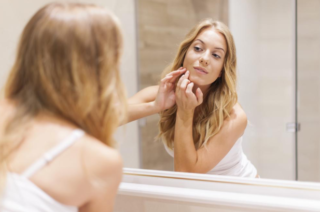
More Beauty Skin Care & Gorgeous Smiles Articles
How to Deal With Hormonal Acne

Acne affects four out of every five people between the ages of 11 and 30. No matter how strong and consistent your skincare routine might be, the odds are high that you will still experience some acne at some point. You can reduce the number of breakouts and their severity with good hygiene. If you haven’t developed your preferred strategy, you might consider vitamins for clear skin, a diet low in dairy products, or a consistent time of day when you clean all makeup and oil from your face.
A rarer type of breakout is hormonal acne. This affects a significantly smaller group of people than common acne, and it is much more serious if you suspect you have it. Hormonal acne is most common in teenagers going through puberty because of the hormonal changes that occur during that process. However, adults with hormonal imbalances can experience it as well, including those caused by menstruation or menopause. For example, menopause causes women to experience a drop in estrogen levels.
How Can I Tell If I Have Hormonal Acne?
If you are in any of the demographics mentioned above where you may be experiencing hormonal imbalances, you have an elevated risk compared to the general population. Hormone fluctuations can cause overall skin inflammation and clogged skin cells in hair follicles.
Someone going through puberty will likely notice acne on their forehead, nose, and chin. Adults are more likely to notice acne along their jawline and the bottom of their cheeks. For some, hormonal acne produces blackheads and small pimples similar to what people characterize as common acne. However, cysts or white bumps can form under the skin. These don’t come to a head on the skin’s surface like other acne, and the bumps become painful to touch.
Can I Prevent Hormonal Acne?
As mentioned earlier, sometimes hormonal changes and imbalances can cause acne regardless of your skincare routine. Nonetheless, you’re wise to figure out which strategy keeps your skin the clearest. You can research vitamins for clear skin and products to exfoliate your skin. One of the most effective ways to prevent unnecessary breakouts is by removing any makeup, dirt, or oil from your face every day. Never sleep in your makeup.
You can also reduce your chances of acne by keeping your hands and hair away from your face throughout the day. Consuming fewer dairy products or other foods that are high in simple sugars can aid your skin health. If you notice your skin drying out, you can use moisturizing lotion or cream as part of your skincare routine.
What Are Ways to Treat Hormonal Acne?
If you have a more severe case of hormonal acne, you will likely need antibiotics or prescription-strength creams, especially if you notice cysts or bumps. If you need something stronger than over-the-counter products, you will need a prescription from a dermatologist. They will diagnose your skin condition and explain the best treatment strategy before writing the prescription.
Antibiotics are usually taken in pill form. Gels and creams are typically applied to the affected area. These products kill the bacteria and decrease inflammation. Similar to reducing inflammation for other medical conditions, you can also apply ice for a specified amount of time.
It is important to realize acne cysts can take three months or longer to go away. Trying to rush the process by popping the zits or increasing your prescription dosage risk further complications. Unlike other pimples or blackheads, these don’t contain puss that you can pop. Rather than eliminating any puss under the skin, you will open your skin up to more bacteria and possibly increase your chances of infection.
Conclusion
While acne is commonplace for teenagers and young adults, one should keep an eye on the condition if it becomes more severe. A consistent skincare routine with vitamins for clear skin, moisturizing cream, or other over-the-counter products can assist with preventing acne. However, some cases of acne occur anyway. One of these is hormonal acne, which can be more common in individuals going through puberty or menopause.
If your acne appears to be more severe and is causing you pain, you should consider seeing a dermatologist. They will give you a diagnosis and a recommended treatment plan. Following the doctor’s prescription and treatment plan is the best way to eliminate hormonal acne. Unfortunately, you cannot rush the timeline while you are treating it. Keep in mind that this can take upward of three months and stay the course.
Other Articles You May Find of Interest...
- Plastic Surgery Without Anesthesia?
- The Top Benefits of Dermal Fillers for Rejuvenated Skin
- When To Start Botox? Here’s What Dermatologists Recommend
- What Safety Measures Should Be Taken Before Abdominoplasty Procedures in Sydney?
- 6 Benefits of Regular Exfoliation for Maintaining Clean and Healthy Skin
- Staying Healthy and Beautiful After 50: The Complete Guide for Women
- Summer Hair Care Tips: Keeping Your Hair Healthy and Hydrated

















